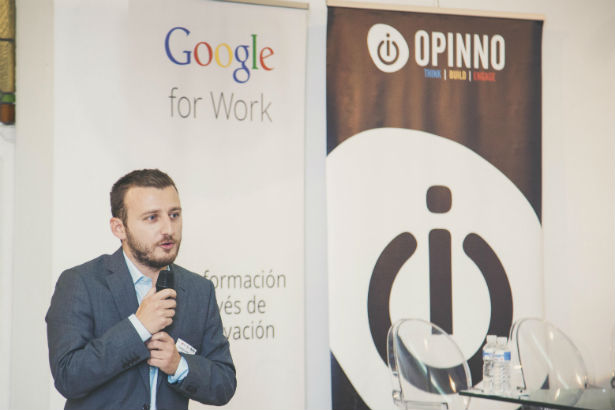The working day New Ways of Working organized by Opinno and Google went over the new work models, based on flexibility, innovation and integration.
“Our generation has the good or perhaps bad luck of living in an era in which the great changes in people’s lives happen every 85 years”, says the vice president of Opinno Think, Tommaso Canonici. People need to be prepared to adapt to these vital transformations that occur more and more often. However, Canonici remembers that businesses, as the economic engine of society, have also got to be capable of adapting to new demands, not just from clients, but from employees as well.
Canonici made these comments during the New Ways of Working conference that his company, with the help of Google and MIT Technology Review in Spanish, organized last week in Madrid (Spain). The central topic of the event was the impact that new ways of working has on the transformation of large businesses.
The objective of the talk was to go over the new work models and the accumulated experience by large Spanish companies that have made this type of policies work. More than a hundred business leaders had the opportunity to listen to the recipes and success stories associated with the new work methodologies in this meeting celebrated in the European Institute of Design’s headquarters in Spain.
The main points shared by the seven speakers were the importance of telework, timetable flexibility, the creation of an innovative work ecosystem and the search of talented people with the ability to transform.

“The cultural transformation of a company first has to go through the people who work there”, assured the general director of the European Institute of Design in Spain, Ricardo Marzullo, who was in charge of opening the round of presentations. Also, the director of Opinno Strategy, Daniel Medina, added: “The employees are the root of everything, we need talented people with an innovative personality to be able to start this transformation”.
On of the best examples of business transformation is Repsol. The Planning and Corporate Culture manager of the company, Laura Martínez de Juan, went over her strategies to spread both efficiency and quality of life amongst workers. Martínez de Juan highlighted the different telework policies that have been applied in Repsol, adaptable to the needs of each employee, and their integration plans for every social and personal circumstance in which an employee could find himself in.
In her opinion, “timetable flexibility is the key to reaching opportunity equality and reconciliation in companies”. The expert also considers it necessary “to have a coaching sessions for teams and leaders to give more prominence to employees, the future of a business”.
Happy employee, successful business
“A satisfied worker makes for a productive company”, said the Eulen’s CIO Miguel Ángel Bayona, who highlighted the importance of making employees feel confortable. According to him “they should feel like they are at home to be happy in what they do and be more open to innovation” The CEO of CEOE International, Antonio Fontanini, also talked about the how “the happiness of employees is the more important thing if you want a successful business”.
When it was Google’s turn to take to the stage, the Human Resources’ general director, Javier Martín and the Account Manager of Google For Work, Alberto Céniz, gave the speeches. They both emphasized the need to implement innovation culture at the heart of a business, instead of isolating it in the innovation department. An example of how to put these ideas in practise in the 80/20 policy set up by the Internet giant in which each employee can dedicate 20% of their workday to doing whatever they want.



